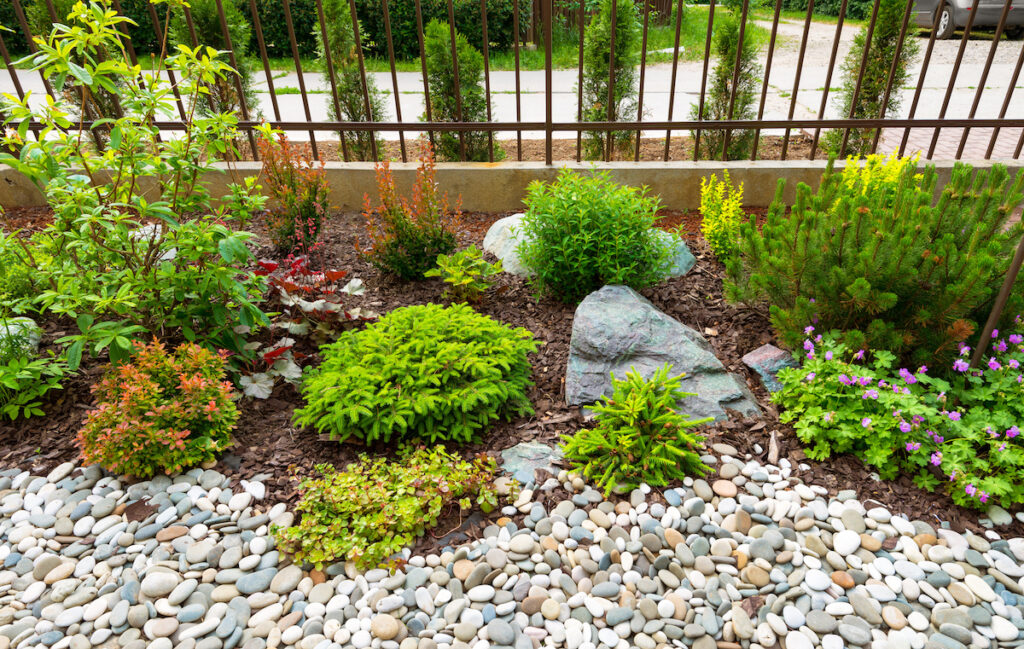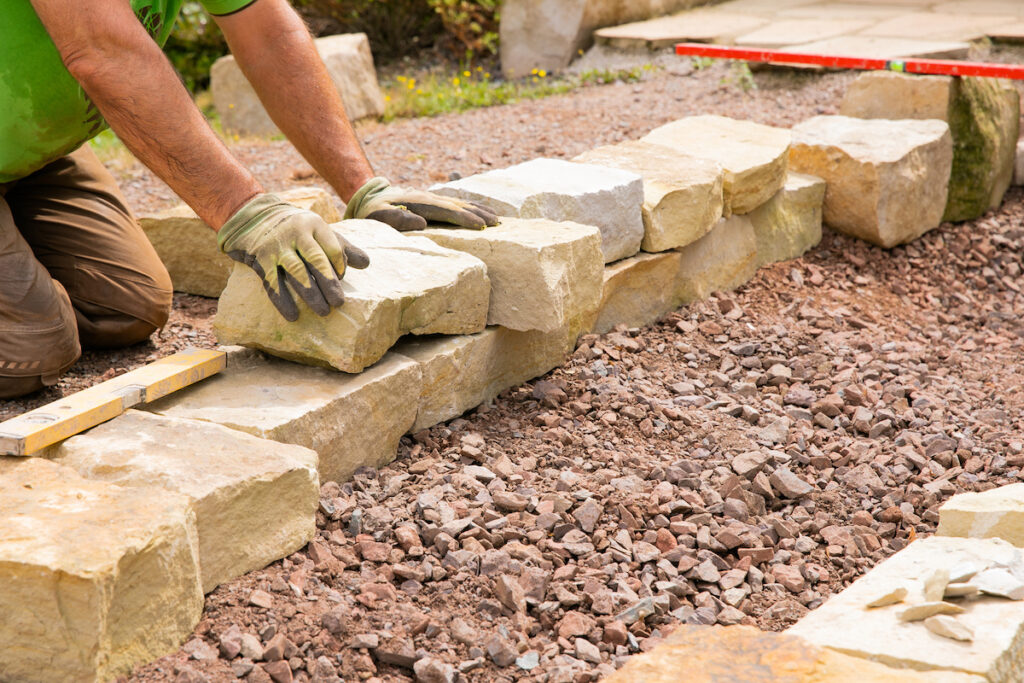When you’re looking for a robust element to add to your landscaping, rocks can be a great solution. They offer dimension to your existing yard and can give a more natural appeal, blending into the area’s natural geological landscape.
Whether you’re looking to section off a gardening area or want to line your paved pathway with beautiful landscaping rocks, there are so many to choose from. Here are some of the best types of rocks for landscaping and how to utilize them in your yard.

1) Artificial Rocks
Artificial landscaping rocks are a great way to cover up any unsightly things in your yard such as manhole covers, sump pumps, transformers, pump systems, and more. Artificial rocks can come in a wide array of sizes, from 60 inches to cover a large transformer to a small 12-inch stone to cover up a small backflow accessory. These are a great way to create semblance in your yard, hiding pipes and features that stand out against the beautiful nature of your property.
2) Boulders
Landscape rocks doesn’t need to be limited to rock mulch or bedrock among planters. You can go big by using boulders in strategic manners to help mitigate larger areas of landscaping without the trouble of laying bags and bags of rocks.
Boulders can be used in a few different ways in your yard’s landscaping, including:
- Stacked for a retaining wall
- Positioned strategically in the back end of your property to mitigate mowing
- Filled in with smaller rocks between them to take up more space
- Used as a way to enclose mulch or other plants in your front or side yard garden beds
Of course, the one stipulation of utilizing boulders in your yard is the limitations of moving them. A professional team can help load and unload them in your yard. If you choose to DIY, be careful and use the right tools and safety precautions when moving such large rocks.
3) Cobblestone
Who doesn’t love a cobblestone pathway? Cobblestone pathways are very European and offer a unique, but timeless appeal to your yard. While it can be time-consuming to install, the long-lasting benefits offer you a very low-maintenance but high-end solution to your landscaped pathway.
4) Crushed Granite Gravel and Marble Chips
Made from quarrying waste, this manmade gravel is collected and used in buildings and commercial or residential landscaping. Crushed granite gravel is a beautiful choice if you want to utilize gravel in your landscaping but want the stunning color and uniqueness of granite.
Crushed marble chips, on the other hand, are a great alternative to standard landscaping rocks. These white, medium-sized rocks are great for lining walkways or patios. They’re very low-maintenance as they are highly resistant to deterioration as well as ants, termites, and other pesky critters.
5) Lava Rocks
Yes, you can use actual lava rocks in your next landscaping adventure— and you’ll be glad you did. This volcanic rock is highly porous, which makes it an amazing filter for water and actually helps conserve water. Planting beds through your lava rock can be highly beneficial and with these rocks providing a weed and insect barrier, your plants can thrive.
While lava rocks are a bit more expensive up front, the benefits include a long-life with little maintenance and a unique red color that will enhance your yard’s look, all while protecting against weeds, bugs, and drying out. Plus, they’re incredibly lightweight which makes for an easy installation.
6) Mexican Beach Pebbles
If you’re looking to install some rock in an area that will get a lot of foot traffic, like a pooldeck or zen garden, you know that jagged landscaping rocks just won’t do. You could look for something with a smooth appearance and feel like Mexican beach pebbles.
This landscaping includes ocean or river rock that has been smoothed out due to corrosion to become smooth, round rocks that are easy to walk on, even with bare feet! Additionally, these rocks will never fade or crack and won’t need to be replaced as frequently as other types of rock.

7) Pea Gravel
Pea gravel is, you guessed it, small pea-sized stones. Pea gravel is very frequently used on outdoor patios where you have a cafe table or outdoor sofa that you don’t want to have on grass, gravel, or stones. These can easily fill a space and are much easier to walk on than larger rock landscaping options. It’s highly affordable and very low-maintenance but there are a few downfalls to consider before installing this type of rock.
- You can’t lay this directly onto soil. You will need to install plastic barrier and fabric underneath, similar to when you install wood mulch. This will ensure the gravel stasyin place and doesn’t sink deeper into the soil.
- Their small size makes them highly susceptible to scattering through your yard. Be wary when mowing around the area, or install a small retaining wall of stones to keep them in the area.
- If you don’t pay close attention, you can notice weed growth coming up, but by properly sealing the plastic barrier, you should be able to keep weeds controlled with this type of gravel.
8) River Rocks
River Rocks provide an effective alternative to mulch in lawns. Because of their attractive beauty, these natural rocks can sometimes fill spaces between stone steps or as an alternative to decorative drainage in areas needing them. This type of landscaping rock is excellent for use in backyards. If the area has no water features, you can still utilize river rocks as a decorative piece in your landscaping design.
Skip the Greenery and Embrace Landscaping Rocks
When you’re looking for other solutions to your yard that don’t include constant weeding and mowing, landscaping rocks are a great alternative. Let the professional landscapers at Three Timbers help you design and execute a stunning landscape for you. Reach out today to see how our five-star service can help you get the yard you’ve always wanted.


